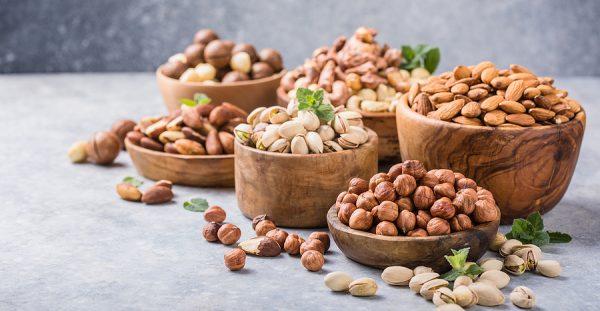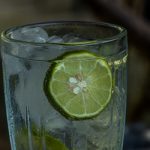By David Blyweiss, M.D., Advanced Natural Wellness
The biggest fear for women who have survived breast cancer is that it will come back. This is a threat that survivors of all types of cancer face every day.
Sadly, there is no silver bullet to prevent recurrence. However there are things you can do in your life to help lower your risk. You probably already know that weight loss, stress reduction, plenty of physical activity and a healthy diet can all go a long way toward helping you remain cancer free.
But you may not be aware of a few specific foods that can have a big impact on your life when it comes to remaining cancer free.
The first is a favorite of mine, nuts.
I love nuts. I buy Brazil nuts, walnuts, pecans, hazelnuts, pistachios, cashews – whatever grabs my attention – and I eat them every day. Sometimes I enjoy them by the handful as a snack. Other times I add them to my salads and meals.
Tree nuts, in particular, are a great source of protein and healthy fats. They’re loaded with vitamins, minerals, antioxidants and other compounds that fuel your body and protect against disease – including cancer.
In fact, a recent study found that five years after being diagnosed with breast cancer, women who ate nuts regularly had higher disease-free survival rates than those who didn’t eat nuts. It amounted to a 50% reduced risk of breast cancer recurrence, metastasis or mortality.
Eating nuts appeared to have a better effect on women with early-stage breast cancer. So the sooner you start eating nuts after diagnosis, the better your chances of cancer free survival.
You can thank the phytochemicals in nuts for this chemo-preventive effect. These compounds help prevent cancer cells from spreading and invading healthy cells, and work to reduce the survival rate of existing cancer cells. So they help stop the development and growth of tumors.
And nuts aren’t just good for cancer prevention. They are also associated with a lower risk of other chronic diseases like cardiovascular disease, type 2 diabetes and Alzheimer’s.
With this in mind, I prescribe a handful of nuts daily to help protect against breast cancer and breast cancer recurrence.
Eat Your Cruciferous Veggies
Nuts aren’t the only type of food that can help you in your battle. Cruciferous vegetables are one of your greatest weapons against cancer. It’s a shame more people don’t realize that.
Sulforaphane, the active ingredient in these veggies will help detox you and protect against breast cancer. And the 3,3’-diindolymethane (DIM) in the crucifers helps reduce the high estrogen levels that promote breast cancer.
Cruciferous vegetables like arugula, bok choy, broccoli, cabbage, cauliflower, radish, Chinese cabbage, collard greens, Brussels sprouts, turnips and kale are the primary source of DIM in our diets. So it’s a good idea to eat them as often as you can.
Try to include one or more of them at each meal. Add some arugula and radish to your salads. Roast some broccoli or cauliflower with your dinner. Put some cabbage and turnips in your soup.
And get this!
If you chop some of those veggies up and turn them into a curry, you can magnify their power. That’s because the key compound in curry is turmeric. It’s loaded with a powerful antioxidant called curcumin, which contains anti-cancer compounds.
First, curcumin can prevent precancerous cells from turning into full-blown cancer. Second, it appears to actually kill cancer cells. And third, it can stop more cancer cells from growing. Plus, it helps detox heavy metals that can contribute to breast cancer.
When you add black pepper to your curry, you will enhance your body’s ability to absorb the curcumin. So make sure to add a sprinkle or two while you’re cooking.
Enjoy the “Fungus Among Us”
Mushrooms have been used as medicine for thousands of years. Some countries like Japan and China still use them. But it’s taking a long time for modern medicine in other countries to rediscover their health effect. The U.S. is one of those countries.
One of the things mushrooms have going for them is they are the most abundant source of ergothioneine (ergo) in our food supply. This is a super-antioxidant that may be protective against cancer, particularly breast cancer.
Shiitake, oyster, maitake and king oyster mushrooms have the highest amounts of ergo in them. But eating any type of mushroom daily – including white buttons, creminis and portabellas – appears to lower the risk of cancer by an astonishing 45 percent.
The more cancer-preventive foods you add to your diet, the better your chances of living a cancer-free life!
SOURCES:
Wang C, Gu K, Wang F, Cai H, Zheng W, Bao P, Shu XO. Nut consumption in association with overall mortality and recurrence/disease-specific mortality among long-term breast cancer survivors. Int J Cancer. 2022 Feb 15;150(4):572-579.
Breast cancer survivors: eat nuts. Vanderbilt University Medical Center. News Release. Nov 2021.
Falasca M, Casari I, Maffucci T. Cancer chemoprevention with nuts. J Natl Cancer Inst. 2014 Sep 10;106(9):dju238.
Klimova B, Kuca K, Valis M, Hort J. Role of Nut Consumption in the Management of Cognitive Decline – A Mini-Review. Curr Alzheimer Res. 2018;15(9):877-882.
Thomson CA, Rock CL, Thompson PA, Caan BJ, Cussler E, Flatt SW, Pierce JP. Vegetable intake is associated with reduced breast cancer recurrence in tamoxifen users: a secondary analysis from the Women’s Healthy Eating and Living Study. Breast Cancer Res Treat. 2011 Jan;125(2):519-27.
Liu X, Lv K. Cruciferous vegetables intake is inversely associated with risk of breast cancer: a meta-analysis. Breast. 2013 Jun;22(3):309-13.
Shanmugam MK, Rane G, Kanchi MM, Arfuso F, Chinnathambi A, Zayed ME, Alharbi SA, Tan BK, Kumar AP, Sethi G. The multifaceted role of curcumin in cancer prevention and treatment. Molecules. 2015 Feb 5;20(2):2728-69. Ba DM, Ssentongo P, Beelman RB, Muscat J, Gao X, Richie JP. Higher Mushroom Consumption Is Associated with Lower Risk of Cancer: A Systematic Review and Meta-Analysis of Observational Studies. Adv Nutr. 2021 Oct 1;12(5):1691-1704.






